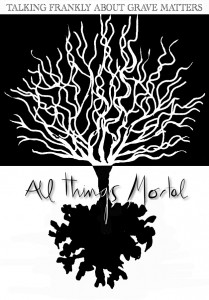 Update 12/16: some projects of All Things Mortal has spun off into a different, statewide group, mainly focused on Home Funeral, and secondly on Green Burial. If you would like to know more about this group, please email us. Transition Wayland will continue to promote this group’s local events.
Update 12/16: some projects of All Things Mortal has spun off into a different, statewide group, mainly focused on Home Funeral, and secondly on Green Burial. If you would like to know more about this group, please email us. Transition Wayland will continue to promote this group’s local events.
All Things Mortal (2/2015)
And so, while 2015 is still young, but perhaps later than we wished, Transition Wayland announces the launch of All Things Mortal, a look with humor and sensibility at our most taboo topic. Our aim is to soften the fear of being with and comforting a dying person and laying that person to rest. Because someday, when the time comes, we shall want that comfort and attention for ourselves or those we love.
We’ll explore how to undertake (no pun) a home death and funeral for someone who doesn’t wish and doesn’t need to die in a hospital. We’ll consider natural burial, what it means to its advocates and what it means to the earth. We may take a road trip to a green cemetery, and we shall want to show the film on the genesis of one, the touching story in A Will for the Woods. We’ll talk about death in death cafes. We’ll train an eye on the medical profession’s complicity in transforming an ordinary experience into a problem to fix. Finally, we’ll examine what happens in our last weeks or months, when we turn from the reality of our dying to extending our days at any cost.
Because some of us have been thinking about this a long time, we have become acquainted with practitioners who will work with us. Because others have been thinking about this a lot longer, there are models and materials we can draw on.
Workshop. Reclaiming the Care of Our Dying and Our Dead. Peg Lorenz, founder of Peaceful Passage at Home and a home death advocate, will lead our first workshop on Saturday, March 21, 2015, at the Church of the Holy Spirit (169 Rice Road, Wayland). Peg will introduce home deaths, wakes, and funerals. She will demystify the legal facts and logistical details – death certificates, keeping the body at home, transporting the body for burial or cremation. There will be time for discussion, questions, and answers. In the final hour, for those who are interested, Peg will demonstrate bathing, dressing, cooling, and carrying the body.
Death cafes got their start in 2004. Today there are registered groups in 26 countries. Neither bereavement group nor counseling session, death cafes are gatherings of tea and cake and facilitated open conversation about death. Those who wish to listen are as welcome as those who want to speak. A dedicated site, deathcafe.com, lists upcoming cafes and offers advice and a variety of do-it-yourself instructions. In 2014 the Boston Globe reported on a death cafe at the Reuben Hoar Library in Littleton. Lessia Shajenko attended the event: “Our mothers teach us to knit, to count money, to change diapers. Why doesn’t anyone teach us to talk about death?” Our first death cafe will be held in April. Watch for the announcement.
Film on Green Burial. A Will for the Woods (2013), winner of awards at eight film festivals, tells the story of a young, terminally ill psychiatrist and musician whose search for meaning in death brings natural burial and land conservation to Wake Forest, North Carolina. We have invited one of the directors to present the film and answer questions. We’ll bring this film to our community in collaboration with the Funeral Consumers Alliance of Eastern Massachusetts. advocates for meaningful and affordable funerals, and Green Burial in Massachusetts, a non-profit that is seeking a site in Western MA for a natural cemetery under a land trust. Mount Auburn in Cambridge was the first cemetery in the state to offer natural burial.
Those are our plans, but they are not the extent of our hopes. We hope to engage Stephen Jenkinson, storyteller and author of the forthcoming book Die Wise: A Manifesto for Sanity and Soul. Stephen draws on years of experience counseling dying people as director of palliative care at a large Canadian hospital. He is also the subject of Griefwalker, a National Film Board of Canada film, and an engaging speaker. We would screen the film and Stephen would talk about his life-long work of changing attitudes toward death.
Like home birth in the 1960s, the experiences of death seem to have become so alien that professionals need to manage them. But that is not true. Just as we know birth, we know death. It is in our genes. This is what it means to be a human being, and facing that fact greatly enriches our finite time on earth.
There is so much more that we can do, but first we welcome your thoughts. Please write to us at info@transitionwayland.org with ideas or comments, and for dates, updates, and more information, visit www.transitionwayland.org
All are welcome
Please keep me posted on the schedule
Pingback: 4/19: Cake and Grave Matters | Transition Wayland